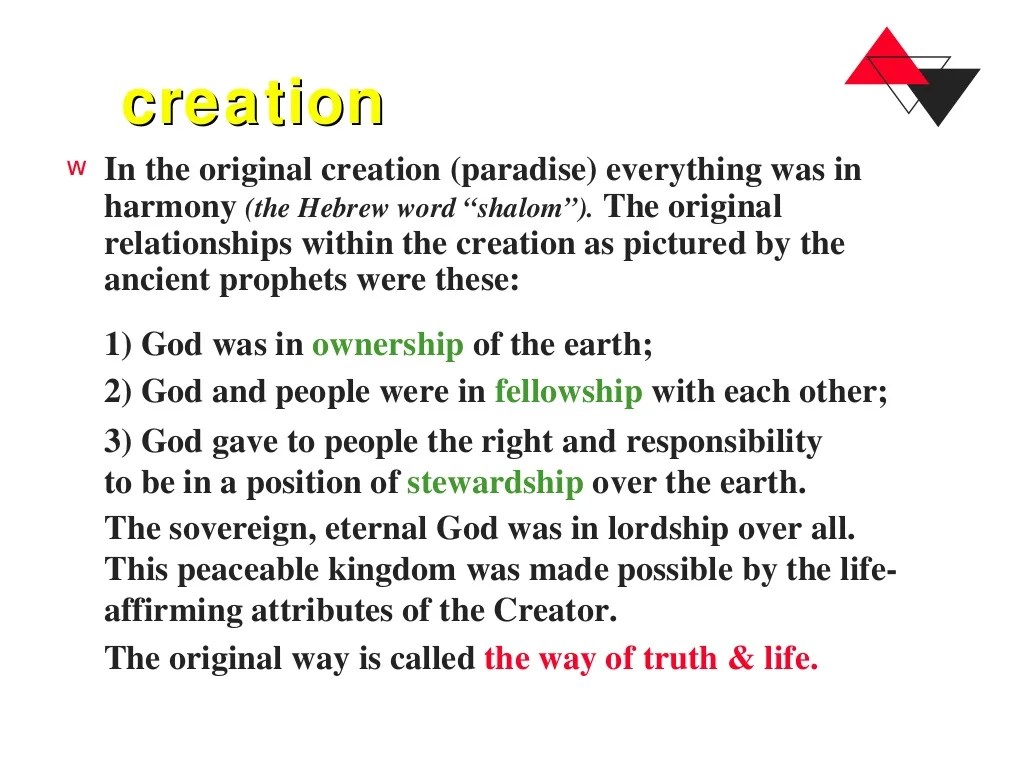Embarking on a journey of discovery, we delve into the basics for a biblical worldview, a transformative framework that shapes our understanding of the world and our place within it. Rooted in the teachings of Scripture, this perspective provides a compass for daily living, guiding our choices and illuminating our path.
Through the lens of a biblical worldview, we gain insights into the nature of creation, the complexities of human nature, and the grand narrative of history. It empowers us to navigate the complexities of life with wisdom and purpose, offering hope and assurance in the face of uncertainty.
Core Beliefs

A biblical worldview is grounded in the fundamental doctrines revealed in the Bible. These beliefs shape our understanding of God, humanity, sin, salvation, and the purpose of life. They provide a framework for interpreting the world and guide our daily living.
The Nature of God
The Bible teaches that God is the creator and sustainer of all things. He is eternal, omnipotent, omniscient, and holy. He is a personal God who desires a relationship with us.
This belief has profound implications for our lives. It reminds us that we are accountable to God and that our actions have consequences. It also gives us hope and comfort, knowing that we are not alone in this world and that we have a loving Father who cares for us.
The Nature of Humanity
The Bible teaches that humans are created in the image of God, but that we have fallen into sin. Sin has separated us from God and corrupted our nature.
This belief helps us understand our own struggles and weaknesses. It also emphasizes the need for salvation, which is only possible through Jesus Christ.
The Nature of Sin
The Bible teaches that sin is rebellion against God. It is anything that falls short of His perfect standards.
This belief reminds us that we are all sinners and that we need God’s forgiveness. It also motivates us to live holy lives, in accordance with God’s will.
The Nature of Salvation
The Bible teaches that salvation is a free gift from God, made possible through the sacrifice of Jesus Christ on the cross.
This belief gives us hope and assurance of eternal life. It also transforms our lives, as we are no longer slaves to sin but children of God.
The Nature of the End Times
The Bible teaches that Jesus Christ will return to earth to judge the living and the dead. The righteous will inherit eternal life, while the wicked will be condemned to eternal punishment.
This belief gives us a sense of urgency to share the gospel with others and to live our lives in accordance with God’s will.
The Significance of Scripture, Basics for a biblical worldview
The Bible is the written Word of God and the foundation of our beliefs. It is the ultimate authority for our faith and practice.
By studying the Bible, we can learn more about God, His character, and His plan for our lives. We can also find guidance and wisdom for our daily living.
Understanding Creation

The biblical account of creation is a foundational narrative that shapes our understanding of humanity’s place in the world. It reveals the nature of God as the Creator, the origin of the universe, and the relationship between humans and the natural world.
Basics for a biblical worldview help us understand our place in the universe and our relationship with God. Doctrine and Covenants 6:36 teaches us that we are all children of God and that He loves us unconditionally. This knowledge empowers us to live our lives with purpose and meaning, knowing that we are part of something bigger than ourselves.
God as Creator
The Bible affirms that God is the sovereign Creator of all things. Through his spoken word, he brought into existence the heavens, the earth, and all living creatures (Genesis 1:1-31). God’s creative act is not merely a physical event but also a spiritual one, as he breathed life into humans and gave them a unique capacity for relationship with him.
Humans as Image-Bearers
Humans are created in the image of God (Genesis 1:27), which means we reflect his character and have a special role to play in his creation. As image-bearers, we are called to exercise dominion over the earth and to steward its resources wisely.
The Natural World
The biblical worldview sees the natural world as a gift from God and a testament to his glory. The created order is not inherently evil or chaotic but rather good and ordered. Humans are not meant to exploit or dominate the earth but to care for it and live in harmony with it.
Stewardship
In a biblical worldview, stewardship is a fundamental responsibility. As stewards of God’s creation, we are called to manage the earth’s resources wisely, protect its biodiversity, and promote its well-being. This stewardship extends to all aspects of our lives, from our personal choices to our collective actions as a society.
Human Nature and Morality: Basics For A Biblical Worldview

From a biblical perspective, humans are created in the image of God, endowed with a unique capacity for reason, emotion, and moral discernment. However, the biblical narrative also acknowledges the reality of sin, which has corrupted human nature and led to a broken relationship with God.
According to the Bible, sin is a universal condition, affecting every human being. It is not merely a matter of individual wrongdoing but a fundamental flaw that permeates all aspects of human nature. Sin has separated us from God and has resulted in a world filled with suffering, injustice, and brokenness.
Redemption
The biblical worldview offers hope and redemption from the consequences of sin. Through the sacrificial death and resurrection of Jesus Christ, believers can be reconciled to God and restored to their original purpose. Redemption involves not only the forgiveness of sins but also the transformation of human nature.
Through the power of the Holy Spirit, believers can experience a new life, characterized by love, righteousness, and holiness.
Ethical Decision-Making
A biblical worldview provides a framework for ethical decision-making. It recognizes the inherent dignity and value of every human being, regardless of their race, gender, or social status. Biblical ethics emphasize the importance of justice, compassion, and love. Believers are called to live in accordance with God’s moral law, which is revealed in the Bible and summarized in the Ten Commandments.
Impact on Society
A biblical understanding of morality has a profound impact on society. It fosters a culture of respect, responsibility, and integrity. It promotes social justice, protects the vulnerable, and encourages reconciliation. Societies that embrace biblical values tend to be more stable, prosperous, and harmonious.
History and Culture

A biblical worldview offers a unique perspective on history and culture, recognizing God’s sovereignty and purpose in shaping human events and societal norms.
In contrast to other worldviews, the biblical worldview emphasizes the following key distinctions:
| Biblical Worldview | Other Worldviews |
|---|---|
| God is the creator and ruler of history | History is shaped by natural forces, human actions, or chance |
| History has a purpose and direction | History is meaningless or cyclical |
| Cultural norms should reflect God’s principles | Cultural norms are based on human preferences or societal consensus |
Interpretation of Historical Events
A biblical worldview interprets historical events as part of God’s overall plan for humanity. It recognizes God’s providence in both the rise and fall of nations, the success and failure of individuals, and the overall trajectory of human history.
Role of the Church in Shaping Culture
From a biblical perspective, the church plays a crucial role in shaping culture by:
- Proclaiming God’s truth and values through preaching, teaching, and discipleship
- Demonstrating God’s love and compassion through acts of service and outreach
- Challenging societal norms that conflict with biblical principles
- Encouraging believers to live as examples of God’s kingdom
Eschatology
Eschatology, derived from the Greek word “eschatos,” meaning “last,” encompasses the study of end times and future events in biblical prophecy. It provides a comprehensive understanding of the culmination of history, the return of Christ, the judgment of humanity, and the ultimate destiny of the world.A
biblical worldview shapes our present actions in light of future events. Recognizing the impending return of Christ and the final judgment instills a sense of accountability and urgency in our daily lives. We are motivated to live righteously, make wise choices, and share the gospel with others, knowing that our actions have eternal consequences.
The Return of Christ
The return of Jesus Christ is a central tenet of Christian eschatology. According to biblical prophecy, Christ will physically return to earth to establish His kingdom and reign for a thousand years (Revelation 20:4-6). This event, known as the Second Coming, is a source of hope and assurance for believers, who eagerly anticipate His return to restore justice and usher in a new era of peace and prosperity.
Judgment
Eschatology also includes the concept of judgment, where all individuals will be held accountable for their actions. The Bible describes two primary judgments:
-
-*The Judgment Seat of Christ
Believers will be judged for their deeds and rewarded accordingly (2 Corinthians 5:10).
-*The Great White Throne Judgment
Unbelievers will be judged for their rejection of Christ and sentenced to eternal punishment (Revelation 20:11-15).
The Future of the World
The biblical worldview culminates in the establishment of a new heaven and a new earth (Revelation 21:1). This eternal realm will be free from sin, suffering, and death. Believers will dwell with God in perfect harmony and joy, experiencing the fullness of His presence.
Top FAQs
What is the significance of Scripture in a biblical worldview?
Scripture serves as the authoritative foundation for a biblical worldview, providing the essential doctrines and principles that shape our understanding of God, humanity, and the world.
How does a biblical worldview impact our understanding of human nature?
A biblical worldview recognizes the inherent sinfulness of humanity while also emphasizing the potential for redemption and restoration through the grace of God.
In what ways does a biblical worldview influence our ethical decision-making?
A biblical worldview provides a moral compass that guides our choices and actions, emphasizing love, compassion, and justice as core values.
